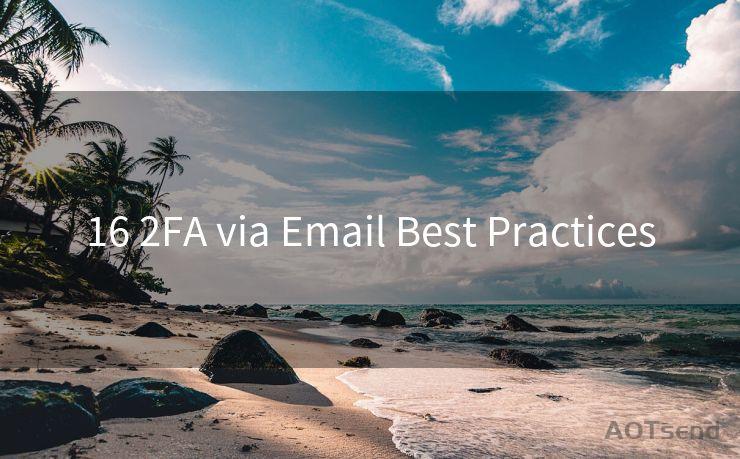16 2FA via Email Best Practices




When it comes to online security, two-factor authentication (2FA) via email has become a crucial layer of protection. By requiring an additional verification step beyond the standard password, 2FA significantly reduces the risk of unauthorized access. In this article, we'll explore 16 best practices for implementing 2FA via email to ensure maximum security.
1. Use Strong Passwords
The first line of defense is always a strong and unique password. Encourage users to create complex passwords that are difficult to guess or crack.
2. Enable HTTPS
Ensure that your website or application uses HTTPS to encrypt all communication, including the transmission of 2FA codes.
3. Educate Users on 2FA
Provide clear and concise instructions on how to set up and use 2FA. This helps users understand its importance and how it works.
4. Make 2FA Optional but Recommended
While it's ideal to have all users enable 2FA, providing it as an option rather than a requirement can reduce friction during the signup process.
5. Test 2FA Regularly
Conduct periodic tests to ensure that the 2FA system is working as intended. This includes testing both the delivery of codes and their validation.
6. Use Reputable Email Providers
Choose an email service provider with a strong reputation for security and reliability. This minimizes the risk of emails being intercepted or codes being stolen.
7. Expire Codes After a Short Period
Set a short expiration time for 2FA codes, typically a few minutes. This reduces the window of opportunity for potential attackers.
8. Limit the Number of Attempts
Implement a limit on the number of failed attempts to enter a 2FA code. This helps mitigate brute-force attacks.
9. Provide Backup Options
Offer alternative methods for receiving 2FA codes, such as SMS or authenticator apps, in case email delivery fails.
10. Monitor and Respond to Suspicious Activity

Have a system in place to monitor for unusual or suspicious activity related to 2FA attempts. Be prepared to respond swiftly in case of a potential breach.
11. Keep Software Updated
Regularly update your systems and software to patch any security vulnerabilities that could affect 2FA.
12. Avoid Using Email for Critical Operations
Consider using more secure methods than email for highly sensitive operations that require 2FA.
13. Implement Rate Limiting
Restrict the frequency of 2FA requests to prevent automated attacks.
14. Notify Users of Changes
If there are any changes to the 2FA process, notify users promptly and clearly explain the updates.
15. Provide Customer Support
Offer support to users who encounter issues with 2FA, ensuring a smooth and secure experience.
16. Continuously Evaluate and Improve
🔔🔔🔔
【AOTsend Email API】:AOTsend is a Managed Email Service for sending transactional emails. Support Email Types: reminders, authentication, confirmations, notifications, verification codes, invoices, password resets, account activations, billing statements, two-factor authentication (2FA), and one-time passwords (OTP) emails, etc. $0.28 per 1000 Emails. 99% Delivery, 98% Inbox Rate.
You might be interested in:
Why did we start the AOTsend project, Brand Story?
What is a Managed Email API, How it Works?
Best 25+ Email Marketing Platforms (Authority,Keywords&Traffic Comparison)
Best 24+ Email Marketing Service (Price, Pros&Cons Comparison)
Email APIs vs SMTP: How they Works, Any Difference?
Regularly review your 2FA implementation and make improvements based on user feedback and security best practices.
By following these best practices, you can significantly enhance the security of your online platform and protect your users from potential threats. Remember, security is an ongoing process, and it's essential to stay vigilant and proactive in maintaining a safe environment for your users.




Scan the QR code to access on your mobile device.
Copyright notice: This article is published by AotSend. Reproduction requires attribution.
Article Link:https://www.mailwot.com/p6563.html



